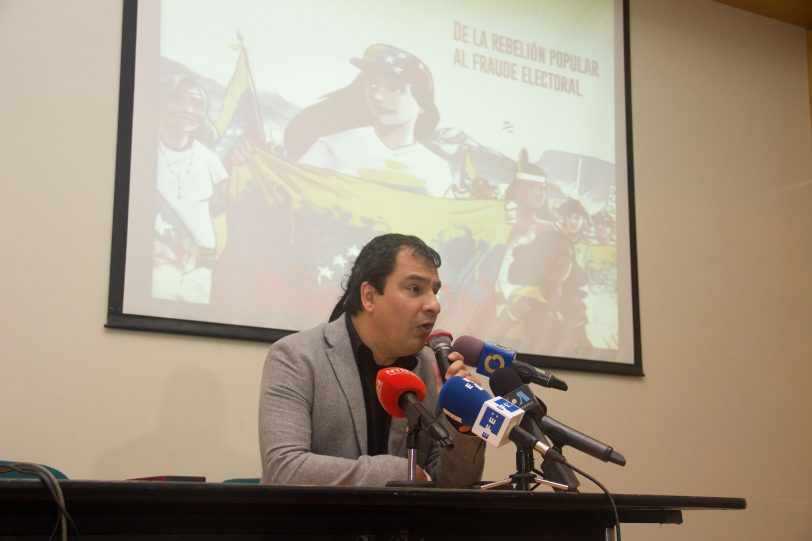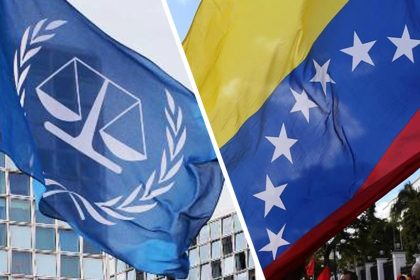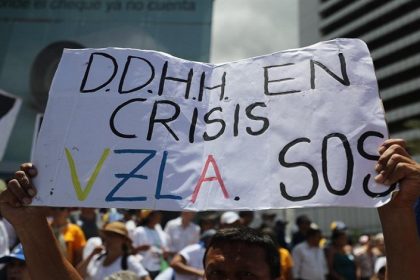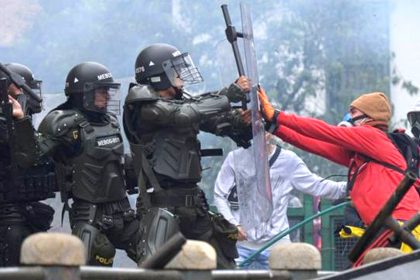The Venezuelan Program of Education-Action in Human Rights (PROVEA, acronym in Spanish) released on Wednesday the 29th edition of its Annual Report on the situation of Human Rights in Venezuela, corresponding to the time period January-December 2017, which registers the main advances, setbacks, challenges and threats to the realization of 14 human rights in our country.
During 2017, Provea documented the worst indicators in terms of human rights since 1989, date on which the preparation of the Annual Report began. Formally, there is no armed conflict or war in Venezuela, but there are as many victims as if there were. The complex humanitarian emergency, institutional violence and insecurity have turned the right to life into the most violated right. The health of people deteriorates irreversibly due to hunger and lack of medication, for not receiving timely and adequate medical attention, for institutional violence under police or military executions, as well as for the excessive use of force and death in the hands of crime. What Provea has warned for the past two years was emphasized: under the government of Nicolás Maduro, there was a situation of social and political exclusion, strengthening inequalities, increasing discrimination and reducing the right to the participation in public affairs as much as possible.
What Provea has warned for the past two years was emphasized: under the government of Nicolás Maduro, there was a situation of social and political exclusion…
During the period covered by this report, the Venezuelan population continued to experience the deterioration of their quality of life, but it also starred the first Venezuelan popular rebellion of the 21st century. Nicolás Maduro’s response was to take an indolent position toward suffering, ordering his military and police forces to resort to the excessive use of force in the face of social protest, and strengthening his dictatorship by fraudulently imposing a constituent national assembly that does not meet the Constitution of the Bolivarian Republic of Venezuela of 1999.
Despite being defeated, the Popular Rebellion in 2017 raised even more the political cost for the Venezuelan repressors. The international community increased the pressure on the dictatorship and some initiatives such as the Report of the United Nations High Commissioner for Human Rights; the Country Report of the Inter-American Commission on Human Rights; the initiation of a procedure by the Office of the Prosecutor of the International Criminal Court for possible crimes against Humanity committed by Maduro’s dictatorship; the reports of the Secretary General of the Organization of American States; the formation of the Lima Group, among others; contributed to further highlighting the sensitive situation of human rights in the country and the need to look for solutions in front of the institutional crisis to return to democracy and respect toward the Rule of Law.
Indolence and repression stifle human rights

Among the main findings, those referring to the situation of the right to food, health, life and personal integrity stand out.
First, it is highlighted that 2017 began with a balance of the Venezuelan food system characterized by a sustained reduction of national production, imports and food consumption, which began to generate alarming levels of acute malnutrition, social tension and an impact on all dimensions of the social and economic aspects.
The damage resulting from the violation of the right to food has been registered among Venezuelans in at least these dimensions: 9 out of 10 Venezuelans cannot afford their daily food; 8 out of 10 Venezuelans said they have eaten less because they did not have enough food at home or because of shortages; approximately 8.2 million Venezuelans eat two or fewer meals a day.
The emergency caused deaths due to prolonged and absolute deprivation of medicines, failure of the services to deal with a greater number of diseases associated with malnutrition, and the appearance of new epidemics.
At the end of 2017, Caritas Venezuela reported a 100% increase in the numbers of acute malnutrition in children under 5 years of age. The first records, in November 2016, indicated severe acute malnutrition in 8% of the children, it raised to 16.2% with severe acute malnutrition (moderate and severe). 33% of children, even recovered, showed irreversible growth retardation. 52% of these forms of malnutrition occur in children under 2 years of age.
The characteristic element of the year was the severity of malnutrition and the associated deaths. In 2016, the complaints of children with malnutrition were more frequent, but it is in 2017 when it becomes evident that this malnutrition began to deepen toward very severe charts and to take more and more lives.
With regard to the right to health, the ravages of a complex humanitarian emergency became evident during 2017. Its consequences were the collapse of the national health facilities, which rested in a public health system that was subjected to a long and systematic destruction. Due to the emergency, the deficit of medical and nursing personnel and the service failures in public hospitals worsened, compromising their operative levels from 50% to 90%, which showed a drop due to the deep disestablishment of the sanitary system. Provea registered 9,662 complaints of violations of the right to health, which represents a 98% increase compared to those registered in 2016 and the largest increase occurred in the last five years.
The emergency caused deaths due to prolonged and absolute deprivation of medicines, inability of the services to treat a greater number of diseases associated with malnutrition and the appearance of new epidemics spread throughout the country with 1,040 cases of Diphtheria and 773 of Measles, in addition to the largest expansion of Malaria ever seen with 400,000 cases. In face of the emergency, the government refused to implement mechanisms of international assistance and cooperation and both health organizations. Also, guilds and unions lost all communication with health authorities, forcing them to go out in peaceful protest to demand guarantees for their rights.
Regarding to the situation of the right to life during 2017, Provea managed to identify a total of 397 victims whose right to life was violated. According to our records, this figure represents an increase of 17.80% compared to the immediate period previous, maintaining an ascending behavior for the sixth consecutive year, which consolidates the increase trend experienced since 2012. This data marks a new record in the total number of deaths caused in hands of state security bodies since 1989. It is necessary to highlight that on 16 November 2017, the Attorney General of Venezuela, Luisa Ortega Díaz, claimed that, according to the data collected by the Venezuelan Public Ministry, 8,291 people would have been killed by agents of the public force from January 2015 to June 2017. The figure provided by Ortega Díaz indicates that around 1,847 people would have been murdered by the Venezuelan security forces from January 2017 to June 2017.
Finally, in regard to the right to personal integrity, Provea registered 7,357 cases that include torture, cruel treatment, illegal raids, injured and/or injured, and threats and harassment. The registered figure, compared to the previous period when a total of 1,790 cases of violations of the right to personal integrity was registered, represents an increase of 411% in the number of violations. Provea registered a total of 2,450 attacks on the civilian population in residential areas, university and school precincts, health centers and religious temples; carried out by agents of the public force and paramilitary groups within the context of the Popular Rebellion April-July, with the aim of curbing popular protest, inhibiting the protesters from continuing to protest and punish urbanisations and communities who mobilized against the dictatorship. In the first five years of Nicolás Maduro’s management (2013-2017), the total number of violations of personal integrity’s cases amounts 30,584, 275% more violations than those recorded in 14 years of management of his predecessor in power.
Building unity to demand the resignation of the dictator

The dictatorship of Nicolás Maduro is a factory of poverty and repression. The increase in hunger and poverty in 2017, and its aggravation during 2018, has led hundreds of Venezuelans to take to the streets to demand the satisfaction of their needs in terms of food, health and public services. The response of the dictatorship has been repression and violence, which -in just five months of the year- have claimed the lives of 13 Venezuelans who have been killed in protests and have locked more than 700 people behind bars for participating in demonstrations since last November. These people, detained for demanding food, have been qualified by Provea as political prisoners of hunger.
For Provea, it is necessary to move forward in the construction of a broad unitary movement to enhance the articulation of the several struggles for democracy in Venezuela. A movement involving the widest range of democratic sectors, committed to the rescue of the country, to demand peacefully in the streets the resignation of Nicolás Maduro, the return to democracy and the full force of the Constitution issued in 1999.
Download the Annual Report here
Provea Press









